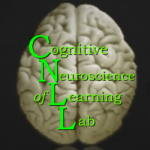research
“What experiences, conditions, and strategies lead to successful learning and mastery of STEM concepts?”
The goal of our research is to improve STEM education by studying how experiences and emotions shape the ways that students learn, reason, and express their knowledge on tests.
We pursue this goal via two broad approaches:
- We conduct experiments in our lab and in schools examining individual differences in cognition and emotion. We also test the effectiveness of various learning interventions.
- We measure and model brain activity to better understand how different neural systems interact to successfully – or unsuccessfully – complete a certain task or learn something new.
Our research ranges from the basic science of examining neural systems to the applied work of teaching new skills to students in schools.
Major research sub-themes are described in more detail below:
- concept knowledge + STEM expertise
- academic anxiety + STEM education
- visuospatial + verbal task strategies
- logical + inferential reasoning
A full list of publications is available here.



